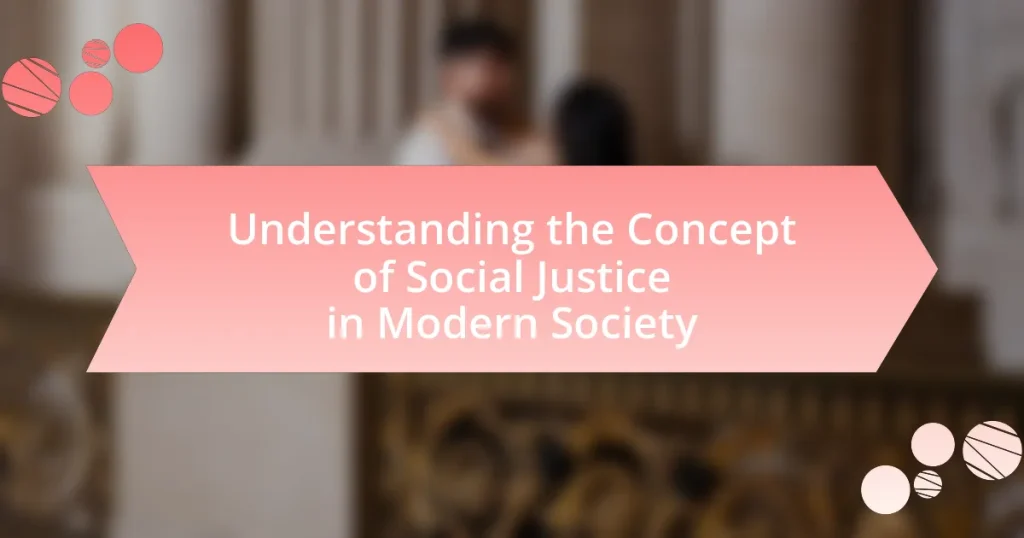Social justice in modern society is defined as the equitable distribution of resources, opportunities, and privileges, aimed at addressing systemic inequalities related to race, gender, and socioeconomic status. The article explores the historical roots of social justice, its varying interpretations across cultures, and its significance in contemporary contexts. It highlights the impact of social justice on marginalized communities, the principles that underpin it, and the challenges faced in achieving it. Additionally, the article discusses the role of education, legal frameworks, and individual actions in promoting social justice, while providing resources for further learning on the topic.
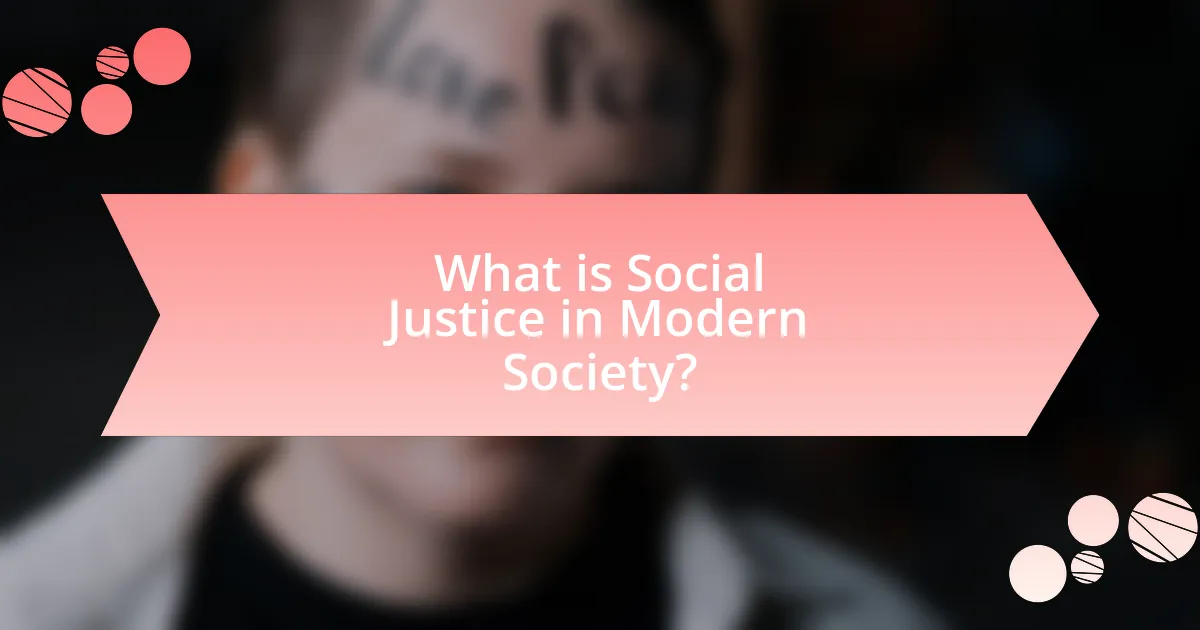
What is Social Justice in Modern Society?
Social justice in modern society refers to the equitable distribution of resources, opportunities, and privileges within a community, ensuring that all individuals have access to the same rights and protections. This concept emphasizes the importance of addressing systemic inequalities related to race, gender, socioeconomic status, and other factors that contribute to marginalization. For instance, the United Nations’ Sustainable Development Goals highlight the need for reducing inequalities and promoting inclusive societies, underscoring the global commitment to social justice.
How is Social Justice defined in contemporary contexts?
Social justice in contemporary contexts is defined as the equitable distribution of resources, opportunities, and privileges within a society, aimed at addressing systemic inequalities and promoting fairness. This definition encompasses various dimensions, including economic, racial, gender, and environmental justice, reflecting the interconnected nature of social issues today. For instance, the United Nations’ Sustainable Development Goals emphasize the importance of reducing inequalities and ensuring inclusive societies, highlighting that social justice is integral to achieving global development objectives.
What are the historical roots of Social Justice?
The historical roots of social justice can be traced back to ancient philosophies and religious teachings that emphasized fairness, equality, and the moral obligation to care for the less fortunate. For instance, concepts of justice in ancient Greece, particularly in the works of philosophers like Plato and Aristotle, laid foundational ideas about equity and the role of the state in promoting the common good. Additionally, religious texts, such as those from Christianity, Judaism, and Islam, advocate for the protection of the marginalized and the pursuit of justice as a moral imperative. These early influences evolved through the Enlightenment, where thinkers like John Locke and Jean-Jacques Rousseau argued for individual rights and social contracts, further shaping modern interpretations of social justice. The culmination of these historical perspectives contributed to contemporary movements advocating for civil rights, economic equity, and social reform, reflecting an ongoing commitment to achieving justice in society.
How do different cultures interpret Social Justice?
Different cultures interpret social justice through their unique historical, social, and ethical lenses. For instance, Western cultures often emphasize individual rights and equality before the law, reflecting Enlightenment ideals, while collectivist cultures, such as those in many Asian societies, may prioritize community welfare and harmony over individual rights. In Indigenous cultures, social justice is frequently linked to land rights and cultural preservation, highlighting the importance of historical injustices and reparative justice. These interpretations are shaped by cultural narratives, religious beliefs, and socio-political contexts, demonstrating that social justice is not a universal concept but rather a culturally specific one.
Why is Social Justice important today?
Social justice is important today because it addresses systemic inequalities and promotes equitable treatment for all individuals, regardless of their background. In contemporary society, issues such as racial discrimination, gender inequality, and economic disparity persist, affecting marginalized communities disproportionately. For instance, according to the Pew Research Center, Black Americans are more likely to experience poverty compared to their white counterparts, highlighting the need for social justice initiatives that aim to rectify these disparities. Furthermore, social justice fosters a sense of community and belonging, which is essential for social cohesion and stability. By advocating for policies that ensure equal rights and opportunities, social justice contributes to a more just and inclusive society, ultimately benefiting everyone.
What impact does Social Justice have on marginalized communities?
Social justice significantly enhances the well-being of marginalized communities by promoting equity, access to resources, and social inclusion. This impact is evident through initiatives aimed at addressing systemic inequalities, such as affirmative action policies and community empowerment programs, which have been shown to improve educational and economic outcomes for underrepresented groups. For instance, research by the American Psychological Association indicates that social justice efforts can lead to increased mental health and social cohesion within marginalized populations, demonstrating the tangible benefits of equitable treatment and representation.
How does Social Justice contribute to societal stability?
Social justice contributes to societal stability by promoting equality and reducing social tensions. When individuals perceive fairness in the distribution of resources and opportunities, it fosters trust in institutions and enhances social cohesion. Research indicates that societies with higher levels of social justice experience lower rates of crime and conflict, as equitable treatment diminishes feelings of disenfranchisement. For example, the World Bank’s 2018 report highlights that inclusive policies can lead to sustainable economic growth and social harmony, reinforcing the idea that social justice is integral to maintaining a stable society.
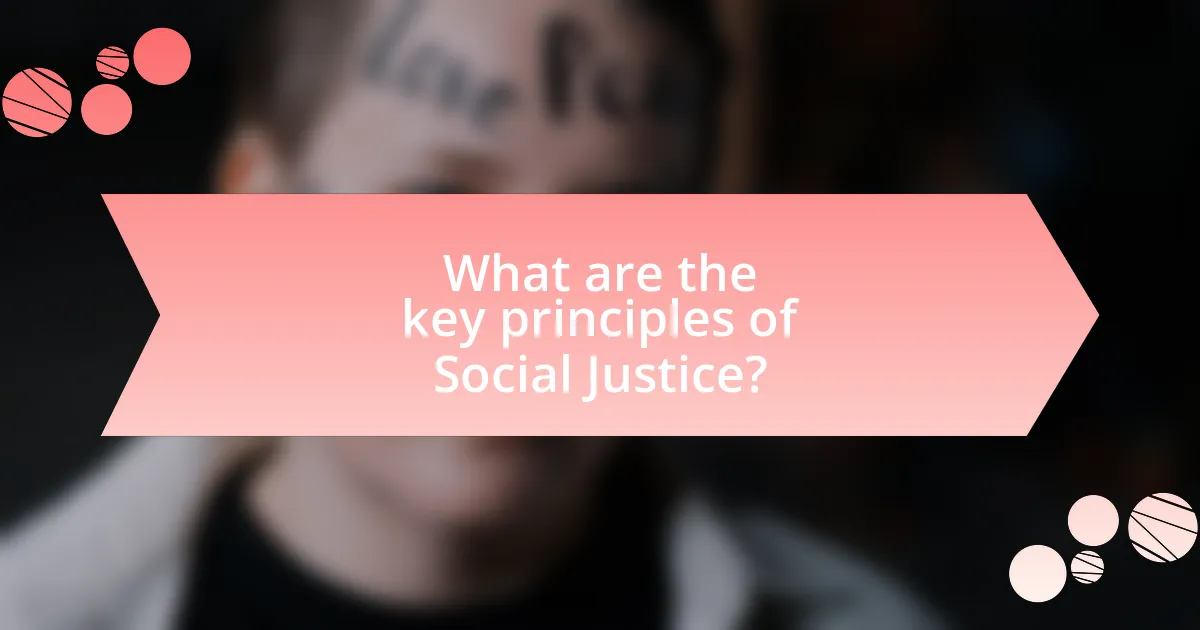
What are the key principles of Social Justice?
The key principles of Social Justice include equity, access, participation, and rights. Equity ensures fair treatment and opportunities for all individuals, addressing systemic inequalities. Access refers to the ability of individuals to obtain necessary resources and services, such as education and healthcare, which are essential for a just society. Participation emphasizes the importance of involving all community members in decision-making processes that affect their lives, fostering a sense of belonging and empowerment. Rights highlight the fundamental entitlements that every individual possesses, which must be respected and protected to achieve social justice. These principles collectively aim to create a society where everyone can thrive, regardless of their background or circumstances.
How do equity and equality differ in the context of Social Justice?
Equity and equality differ significantly in the context of social justice. Equality refers to treating everyone the same and providing the same resources or opportunities, regardless of individual circumstances. In contrast, equity involves recognizing individual differences and providing resources and opportunities tailored to those specific needs to achieve fair outcomes. For example, in education, equality would mean all students receive the same textbooks, while equity would ensure that students who need additional support receive extra tutoring or resources to succeed. This distinction is crucial in social justice, as it emphasizes the importance of addressing systemic inequalities and ensuring that all individuals have the support necessary to thrive.
What role does access to resources play in achieving Social Justice?
Access to resources is fundamental in achieving social justice as it ensures equitable opportunities for all individuals to thrive. When marginalized communities have access to essential resources such as education, healthcare, and economic opportunities, they can overcome systemic barriers that perpetuate inequality. For instance, studies show that access to quality education significantly improves socioeconomic mobility, with the National Center for Education Statistics reporting that individuals with higher education levels earn substantially more over their lifetimes compared to those without. This access not only empowers individuals but also fosters a more equitable society by reducing disparities in wealth and opportunity.
How does participation in decision-making processes relate to Social Justice?
Participation in decision-making processes is essential for achieving social justice as it empowers marginalized groups and ensures their voices are heard. When individuals from diverse backgrounds engage in decision-making, it leads to more equitable outcomes and policies that reflect the needs of all community members. Research indicates that inclusive decision-making can reduce inequalities; for instance, a study by the World Bank found that participatory governance can improve service delivery and enhance social cohesion in communities. Thus, active participation in decision-making is a fundamental aspect of promoting social justice by fostering representation and accountability.
What are the challenges to achieving Social Justice?
Achieving social justice faces several challenges, including systemic inequality, lack of political will, and social apathy. Systemic inequality manifests through entrenched disparities in wealth, education, and access to resources, which perpetuate cycles of disadvantage. For instance, according to the U.S. Census Bureau, the wealth gap between white households and Black households in the United States was approximately 8 to 1 in 2019, highlighting significant economic disparities. Additionally, lack of political will often results in insufficient policy changes or enforcement of existing laws aimed at promoting equity. Social apathy, characterized by a general indifference to social issues, further complicates efforts to mobilize communities for change. These factors collectively hinder progress toward achieving social justice.
What systemic barriers exist that hinder Social Justice?
Systemic barriers that hinder social justice include economic inequality, discriminatory laws, and lack of access to education and healthcare. Economic inequality manifests through wealth disparities, where the top 1% of earners hold a significant portion of global wealth, limiting opportunities for marginalized communities. Discriminatory laws, such as voter ID laws and gerrymandering, disproportionately affect minority groups, restricting their political power and representation. Additionally, inadequate access to quality education and healthcare perpetuates cycles of poverty and limits social mobility, as evidenced by studies showing that individuals from low-income backgrounds are less likely to graduate from high school or receive adequate medical care. These barriers collectively undermine efforts to achieve equitable treatment and opportunities for all individuals in society.
How do economic disparities affect Social Justice efforts?
Economic disparities significantly hinder social justice efforts by perpetuating inequality and limiting access to resources. When wealth is concentrated in the hands of a few, marginalized communities often lack the financial means to advocate for their rights or access essential services such as education, healthcare, and legal support. For instance, a report by the Institute for Policy Studies in 2020 highlighted that the wealth gap between the richest and poorest Americans has reached historic levels, with the top 1% owning more wealth than the bottom 90% combined. This economic imbalance creates systemic barriers that obstruct equitable participation in social justice movements, ultimately undermining the effectiveness of these efforts.
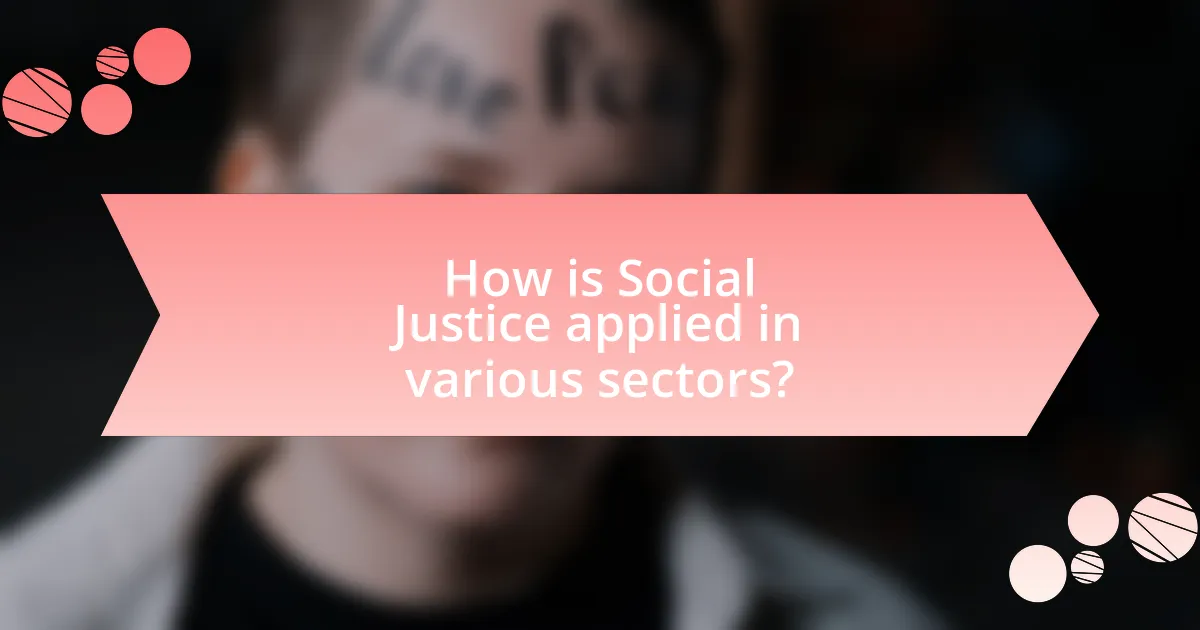
How is Social Justice applied in various sectors?
Social justice is applied in various sectors through policies and practices aimed at promoting equity, inclusion, and fairness. In education, for instance, social justice manifests through initiatives that ensure equal access to quality education for all students, regardless of their socioeconomic background, as evidenced by programs like Title I in the United States, which allocates federal funds to schools serving low-income students. In healthcare, social justice is reflected in efforts to provide universal healthcare access, as seen in countries with single-payer systems, which aim to eliminate disparities in health outcomes based on income or race. The labor sector applies social justice by advocating for fair wages and safe working conditions, supported by legislation such as the Fair Labor Standards Act, which establishes minimum wage and overtime pay standards. In the criminal justice system, social justice is pursued through reforms aimed at reducing systemic biases and ensuring equitable treatment, highlighted by movements advocating for police reform and sentencing equality. Each of these sectors demonstrates a commitment to addressing inequalities and fostering a more just society.
What role does education play in promoting Social Justice?
Education plays a crucial role in promoting social justice by equipping individuals with the knowledge and skills necessary to challenge inequality and advocate for equitable treatment. Through education, individuals learn about their rights, the importance of diversity, and the mechanisms of systemic oppression, which empowers them to engage in social change. For instance, studies show that education increases civic participation; individuals with higher education levels are more likely to vote and engage in community activism, thereby contributing to a more just society. Furthermore, educational institutions that emphasize social justice principles foster critical thinking and encourage students to question societal norms, leading to a more informed and active citizenry.
How can educational institutions foster Social Justice?
Educational institutions can foster social justice by implementing inclusive curricula that reflect diverse perspectives and promote equity. By integrating social justice education into their programs, schools can raise awareness about systemic inequalities and empower students to advocate for change. Research indicates that when students engage with materials that represent various cultures and histories, they develop a greater understanding of social issues and are more likely to participate in civic activities (Ladson-Billings, 1994, “The Dreamkeepers: Successful Teachers of African American Children”). Additionally, institutions can create supportive environments by providing resources and support services for marginalized groups, ensuring that all students have equal access to opportunities.
What are the challenges faced by educational systems in promoting Social Justice?
Educational systems face several challenges in promoting social justice, including systemic inequality, lack of resources, and cultural biases. Systemic inequality manifests in disparities in funding and access to quality education, which disproportionately affects marginalized communities. For instance, a report from the National Center for Education Statistics indicates that schools in low-income areas receive significantly less funding than those in affluent neighborhoods. Additionally, a lack of resources, such as trained educators and adequate facilities, hinders the ability to provide equitable education. Cultural biases within curricula and teaching practices can further alienate students from diverse backgrounds, making it difficult to foster an inclusive environment. These challenges collectively impede the educational system’s efforts to achieve social justice.
How does the legal system address Social Justice issues?
The legal system addresses social justice issues by implementing laws and regulations that promote equality and protect the rights of marginalized groups. For instance, civil rights legislation, such as the Civil Rights Act of 1964 in the United States, prohibits discrimination based on race, color, religion, sex, or national origin, thereby fostering a more equitable society. Additionally, legal frameworks often include mechanisms for individuals to seek redress through the courts, ensuring that injustices can be challenged and rectified. This is evidenced by the numerous landmark Supreme Court cases, such as Brown v. Board of Education, which dismantled racial segregation in public schools, highlighting the legal system’s role in advancing social justice.
What laws and policies support Social Justice initiatives?
Laws and policies that support Social Justice initiatives include the Civil Rights Act of 1964, which prohibits discrimination based on race, color, religion, sex, or national origin, thereby promoting equality. Additionally, the Americans with Disabilities Act of 1990 ensures equal opportunities for individuals with disabilities, reinforcing the principle of inclusivity. The Fair Housing Act of 1968 addresses discrimination in housing, further supporting social equity. These laws collectively create a framework that fosters social justice by protecting marginalized groups and promoting equal rights across various sectors.
How effective are legal frameworks in promoting Social Justice?
Legal frameworks are highly effective in promoting social justice by establishing rights, protections, and mechanisms for accountability. These frameworks, such as anti-discrimination laws and labor rights legislation, create a structured approach to addressing inequalities and injustices within society. For instance, the Civil Rights Act of 1964 in the United States significantly reduced racial discrimination in employment and public accommodations, demonstrating the power of legal measures to foster equality. Additionally, international treaties like the Convention on the Elimination of All Forms of Discrimination Against Women (CEDAW) provide a global standard for promoting gender equality, further illustrating how legal frameworks can drive social justice initiatives.
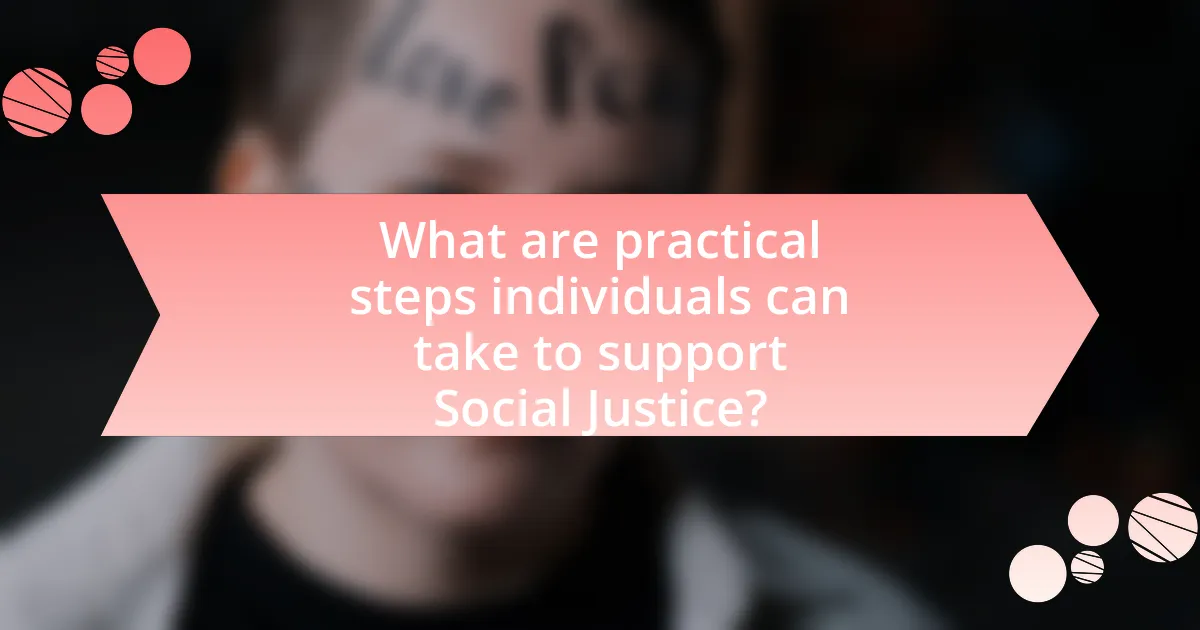
What are practical steps individuals can take to support Social Justice?
Individuals can support social justice by actively engaging in advocacy, education, and community involvement. Advocacy can include participating in campaigns that promote equitable policies, such as voting for candidates who prioritize social justice issues or joining organizations that fight for marginalized communities. Education involves learning about social justice issues, understanding systemic inequalities, and sharing this knowledge with others to raise awareness. Community involvement can take the form of volunteering with local organizations that support underrepresented groups or participating in community discussions to amplify diverse voices. These actions contribute to a collective effort to address and dismantle systemic injustices, fostering a more equitable society.
How can individuals advocate for Social Justice in their communities?
Individuals can advocate for social justice in their communities by engaging in grassroots organizing and raising awareness about social issues. Grassroots organizing involves mobilizing community members to address local injustices, such as discrimination or inequality, through collective action. For instance, the Black Lives Matter movement has effectively utilized grassroots strategies to highlight racial injustices and advocate for policy changes. Additionally, individuals can raise awareness by hosting educational workshops, participating in community forums, and using social media platforms to disseminate information about social justice issues. Research shows that community engagement can lead to increased civic participation and policy reforms, as seen in various successful advocacy campaigns across the United States.
What role does volunteering play in supporting Social Justice causes?
Volunteering plays a crucial role in supporting social justice causes by mobilizing individuals to address systemic inequalities and advocate for marginalized communities. Through volunteering, individuals contribute their time and skills to organizations that work towards social change, such as those focused on poverty alleviation, education equity, and human rights. For instance, a study by the Corporation for National and Community Service found that volunteers are more likely to engage in civic activities, which fosters a culture of activism and community involvement. This engagement not only amplifies the voices of those affected by injustice but also raises awareness about social issues, thereby driving collective action and policy change.
How can social media be used to promote Social Justice awareness?
Social media can be used to promote social justice awareness by facilitating the rapid dissemination of information and mobilizing communities around social issues. Platforms like Twitter, Facebook, and Instagram allow users to share stories, resources, and calls to action, effectively reaching a global audience. For instance, the #BlackLivesMatter movement gained significant traction through social media, leading to widespread protests and discussions about racial inequality. According to a 2020 Pew Research Center study, 69% of U.S. adults believe social media is an important tool for activism, highlighting its role in raising awareness and fostering engagement on social justice topics.
What resources are available for learning more about Social Justice?
Books, online courses, and organizations provide valuable resources for learning about social justice. Notable books include “Just Mercy” by Bryan Stevenson, which discusses systemic injustice in the legal system, and “The New Jim Crow” by Michelle Alexander, which examines racial discrimination in the criminal justice system. Online platforms like Coursera and edX offer courses on social justice topics, often created by universities and experts in the field. Additionally, organizations such as the American Civil Liberties Union (ACLU) and the Southern Poverty Law Center (SPLC) provide educational materials, reports, and advocacy resources that enhance understanding of social justice issues. These resources collectively contribute to a comprehensive understanding of social justice in modern society.
What books and articles are recommended for understanding Social Justice?
Key books and articles recommended for understanding Social Justice include “A People’s History of the United States” by Howard Zinn, which provides a perspective on American history from marginalized viewpoints, and “The New Jim Crow: Mass Incarceration in the Age of Colorblindness” by Michelle Alexander, which discusses systemic racism and its implications in the criminal justice system. Additionally, “Pedagogy of the Oppressed” by Paulo Freire emphasizes the importance of education in achieving social justice. Articles such as “The Case for Reparations” by Ta-Nehisi Coates in The Atlantic explore historical injustices and their ongoing impact. These works collectively offer foundational insights into the complexities of social justice issues.
How can online courses enhance knowledge of Social Justice issues?
Online courses can enhance knowledge of Social Justice issues by providing accessible, structured learning environments that cover diverse perspectives and historical contexts. These courses often include multimedia resources, expert lectures, and interactive discussions, which facilitate deeper understanding of complex social dynamics. For instance, a study by the Pew Research Center found that online education increases engagement and retention of information, making it an effective medium for exploring topics like systemic inequality and human rights. Additionally, platforms like Coursera and edX offer courses from reputable institutions, ensuring that learners receive credible and comprehensive information on Social Justice issues.
